LOGS OF WEDNESDAY, 31-07-2013 :
( All times in CET! )
 |
| Special parking possibility for cars at Pec pod Snezkou (Czech Republic) |
- RADIO PIONEER, 6745kcs, 21.53hrs, SINPO 4433,4-3
( Pop oldies )
- RADIO BLACK ARROW, 6295kcs, 21.59hrs, SINPO 4-5,4434
( Polka music )
- UNID ON 1611kcs, 22.02hrs, SINPO 4-3,434,4-3
( Dutch music )
- RADIO MUSTANG, 6296kcs, 22.04hrs, SINPO 5544,5-4
( Instrumental pop music )
- SLUWE VOS RADIO, 6240kcs, 22.07hrs, SINPO 44344
( Greetings, then pop music / Great music programme by "DJ J."!)
- RADIO BLUEBIRD, 1639kcs, 22.11hrs, SINPO 34233
( Dutch music )
- RADIO RELMUS, 1655kcs, 22.13hrs, SINPO 34233
( Dutch music )
- RADIO BONTE KOE, 6296kcs, 22.15hrs, SINPO 4433,4-3
( Instrumental music, then pop music )
- DE VROLIJKE MIJNWERKER, 1646kcs, 22.18hrs, SINPO 4433,4-3
( Dutch music )
- RADIO BRANDARIS, 1629kcs, 22.41hrs, SINPO 3-4,4233
( Pop oldy )
- RADIO DE WITTEREUS, 1668kcs, 22.45hrs, SINPO 34233
( Dutch music )
- RADIO BATAVIA, 1620kcs, 22.49hrs, SINPO 33333
( Pop oldies )
- BALTIC SEA RADIO, 6910kcs, 22.55hrs, SINPO 3-2,423,3-2
( Pop oldies ) (Signal in LSB!)
- RADIO BATAVIA, 1611kcs, 23.45hrs, SINPO 34333
( Pop oldies )
- UNID ON 1645kcs, 23.48hrs, SINPO 34343
( Dutch music )
- MONTE CARLO RADIO, 1647kcs, 01.06hrs, SINPO 4433,4-3
( Dutch music, then ID and reports in Dutch )
- RADIO CASABLANCA, 1648kcs, 01.10hrs, SINPO 43333
( Instrumental music, then ID and reports in Dutch )
 |
| View to Pec pod Snezkou / Giant Mountains (Czech Republic)
© RIA Novosti. Tatiana Lokshina
Snowden’s father, Lon, to come to Russia
( FBI attempt ):
by Anna Arutunyan at 31/07/2013 13:33
NSA whistleblower Edward Snowden’s father, Lon, said he is planning a visit to Moscow, where his son has been stuck in the transit zone of Sheremetyevo Airport since June 23.
Lon Snowden told the Rossiya 24 TV channel that he would not discuss the issue with the FBI, but go of his own accord.
The comments came after apparent attempts by the FBI to get Lon Snowden to go to Moscow and persuade his son to return to the United States collapsed.
“I said, ‘I want to be able to speak with my son. . . . Can you set up communications?’ And it was, ‘Well, we’re not sure,’” Lon Snowden was quoted by the Washington Post as saying in an interview published on Wednesday. “I said, ‘Wait a minute, folks, I’m not going to sit on the tarmac to be an emotional tool for you.’”
Lawyer Anatoly Kucherena, who helped Edward Snowden apply for temporary asylum in Russia, said he would send an official invitation to Lon Snowden as early as Wednesday.
“The dates [of the trip] haven’t been determined. But we will decide very soon. I’m going to try to send the invitation today,” he told Vesti FM on Wednesday. Kucherena added that he hoped the Federal Migration Service would come to a preliminary decision on Edward Snowden’s asylum request before Lon Snowden’s visit. A preliminary decision would allow Edward Snowden to leave the transit zone.
In the emotional interview that Lon Snowden gave Russia’s Rossiya 24 channel, he thanked Russian authorities.
“I’d also like to thank President Vladimir Putin for what I believe is the courage and the strength to keep my son safe,” he said. “Ed, I hope you’re watching, your family is well and we love you, we hope you’re healthy, we hope you’re well. I hope to see you soon, but most of all I want you to be safe. I want you to find safe haven.”
Lon Snowden told the Washington Post that he had initially cooperated with U.S. authorities about his son and told them everything he could remember. But the talks apparently turned sour, and Lon Snowden condemned U.S. lawmakers for calling his son a traitor.
Edward Snowden, a former contractor for the National Security Agency, leaked a secret court order to the media in early June revealing that Verizon was required to provide data from millions of customers to U.S. authorities. He also revealed that the PRISM surveillance program allowed the NSA and the FBI to tap into nine U.S. Internet companies and gather information about users, including emails and web searches.
He is wanted by the United States on charges that include espionage, and could face up to 30 years in prison if convicted. The U.S. government has pressured several countries, including Russia, not to give Snowden asylum.
|
XKeyscore: NSA tool collects 'nearly everything a user does on the internet'
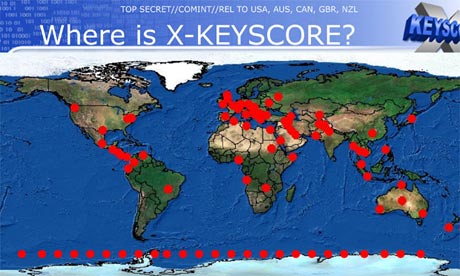
One presentation claims the XKeyscore program covers 'nearly everything a typical user does on the internet'
A top secret National Security Agency program allows analysts to search with no prior authorization through vast databases containing emails, online chats and the browsing histories of millions of individuals, according to documents provided by whistleblower Edward Snowden.
The NSA boasts in training materials that the program, called XKeyscore, is its "widest-reaching" system for developing intelligence from theinternet.
The latest revelations will add to the intense public and congressional debate around the extent of NSA surveillance programs. They come as senior intelligence officials testify to the Senate judiciary committee on Wednesday, releasing classified documents in response to the Guardian's earlier stories on bulk collection of phone records and Fisasurveillance court oversight.
The files shed light on one of Snowden's most controversial statements, made in his first video interview published by the Guardian on June 10.
"I, sitting at my desk," said Snowden, could "wiretap anyone, from you or your accountant, to a federal judge or even the president, if I had a personal email".
US officials vehemently denied this specific claim. Mike Rogers, the Republican chairman of the House intelligence committee, said of Snowden's assertion: "He's lying. It's impossible for him to do what he was saying he could do."
But training materials for XKeyscore detail how analysts can use it and other systems to mine enormous agency databases by filling in a simple on-screen form giving only a broad justification for the search. The request is not reviewed by a court or any NSA personnel before it is processed.
XKeyscore, the documents boast, is the NSA's "widest reaching" system developing intelligence from computer networks – what the agency calls Digital Network Intelligence (DNI). One presentation claims the program covers "nearly everything a typical user does on the internet", including the content of emails, websites visited and searches, as well as theirmetadata.
Analysts can also use XKeyscore and other NSA systems to obtain ongoing "real-time" interception of an individual's internet activity.
Under US law, the NSA is required to obtain an individualized Fisawarrant only if the target of their surveillance is a 'US person', though no such warrant is required for intercepting the communications of Americans with foreign targets. But XKeyscore provides the technological capability, if not the legal authority, to target even US persons for extensive electronic surveillance without a warrant provided that some identifying information, such as their email or IP address, is known to the analyst.
One training slide illustrates the digital activity constantly being collected by XKeyscore and the analyst's ability to query the databases at any time.
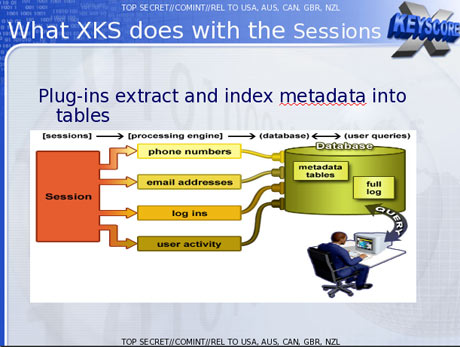
The purpose of XKeyscore is to allow analysts to search the metadata as well as the content of emails and other internet activity, such as browser history, even when there is no known email account (a "selector" in NSAparlance) associated with the individual being targeted.
Analysts can also search by name, telephone number, IP address, keywords, the language in which the internet activity was conducted or the type of browser used.
One document notes that this is because "strong selection [search by email address] itself gives us only a very limited capability" because "a large amount of time spent on the web is performing actions that are anonymous."
The NSA documents assert that by 2008, 300 terrorists had been captured using intelligence from XKeyscore.
Analysts are warned that searching the full database for content will yield too many results to sift through. Instead they are advised to use themetadata also stored in the databases to narrow down what to review.
A slide entitled "plug-ins" in a December 2012 document describes the various fields of information that can be searched. It includes "every email address seen in a session by both username and domain", "every phone number seen in a session (eg address book entries or signature block)" and user activity – "the webmail and chat activity to include username, buddylist, machine specific cookies etc".
Email monitoring
In a second Guardian interview in June, Snowden elaborated on his statement about being able to read any individual's email if he had their email address. He said the claim was based in part on the email search capabilities of XKeyscore, which Snowden says he was authorized to use while working as a Booz Allen contractor for the NSA.
One top-secret document describes how the program "searches within bodies of emails, webpages and documents", including the "To, From, CC, BCC lines" and the 'Contact Us' pages on websites".
To search for emails, an analyst using XKS enters the individual's email address into a simple online search form, along with the "justification" for the search and the time period for which the emails are sought.
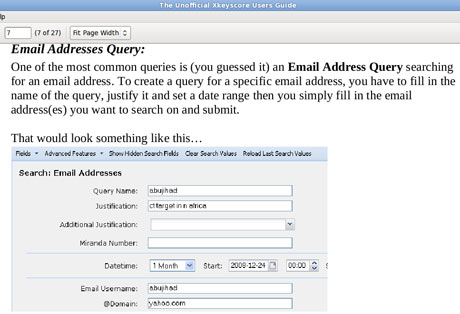
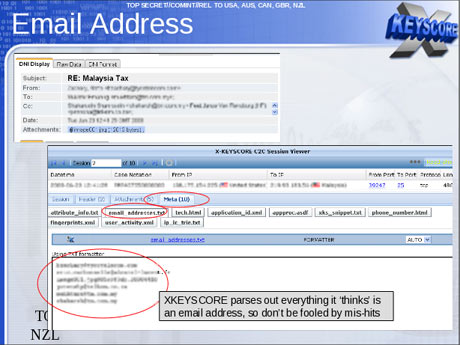
The analyst then selects which of those returned emails they want to read by opening them in NSA reading software.
The system is similar to the way in which NSA analysts generally can intercept the communications of anyone they select, including, as one NSA document put it, "communications that transit the United States and communications that terminate in the United States".
One document, a top secret 2010 guide describing the training received by NSA analysts for general surveillance under the Fisa Amendments Act of 2008, explains that analysts can begin surveillance on anyone by clicking a few simple pull-down menus designed to provide both legal and targeting justifications. Once options on the pull-down menus are selected, their target is marked for electronic surveillance and the analyst is able to review the content of their communications:
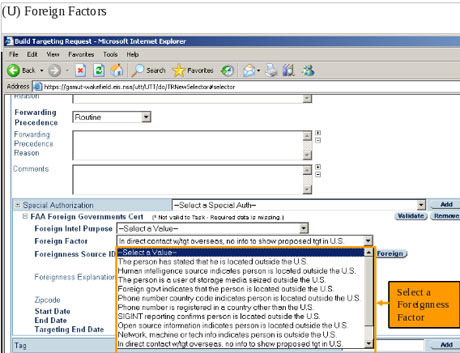
Chats, browsing history and other internet activity
Beyond emails, the XKeyscore system allows analysts to monitor a virtually unlimited array of other internet activities, including those within social media.
An NSA tool called DNI Presenter, used to read the content of stored emails, also enables an analyst using XKeyscore to read the content of Facebook chats or private messages.
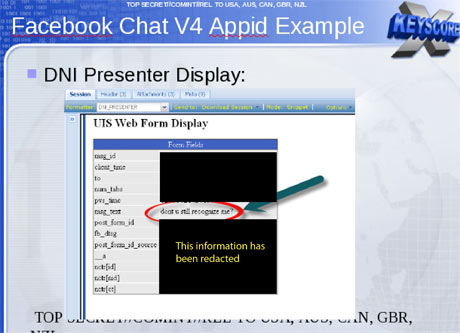
An analyst can monitor such Facebook chats by entering the Facebook user name and a date range into a simple search screen.
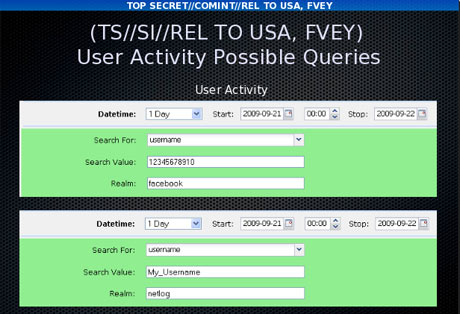
Analysts can search for internet browsing activities using a wide range of information, including search terms entered by the user or the websites viewed.
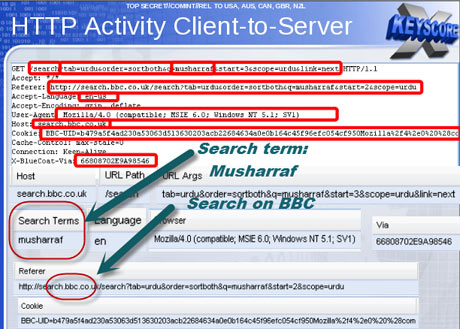
As one slide indicates, the ability to search HTTP activity by keyword permits the analyst access to what the NSA calls "nearly everything a typical user does on the internet".
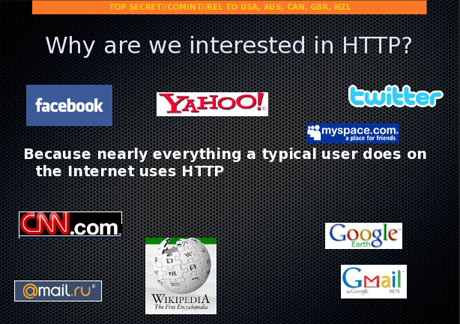
The XKeyscore program also allows an analyst to learn the IP addresses of every person who visits any website the analyst specifies.
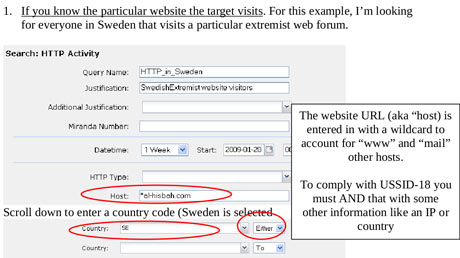
The quantity of communications accessible through programs such as XKeyscore is staggeringly large. One NSA report from 2007 estimated that there were 850bn "call events" collected and stored in the NSA databases, and close to 150bn internet records. Each day, the document says, 1-2bn records were added.
William Binney, a former NSA mathematician, said last year that the agency had "assembled on the order of 20tn transactions about US citizens with other US citizens", an estimate, he said, that "only was involving phone calls and emails". A 2010 Washington Post article reported that "every day, collection systems at the [NSA] intercept and store 1.7bn emails, phone calls and other type of communications."
The XKeyscore system is continuously collecting so much internet data that it can be stored only for short periods of time. Content remains on the system for only three to five days, while metadata is stored for 30 days. One document explains: "At some sites, the amount of data we receive per day (20+ terabytes) can only be stored for as little as 24 hours."
To solve this problem, the NSA has created a multi-tiered system that allows analysts to store "interesting" content in other databases, such as one named Pinwale which can store material for up to five years.
It is the databases of XKeyscore, one document shows, that now contain the greatest amount of communications data collected by the NSA.
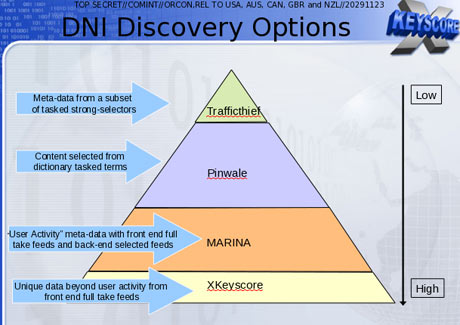
In 2012, there were at least 41 billion total records collected and stored in XKeyscore for a single 30-day period.
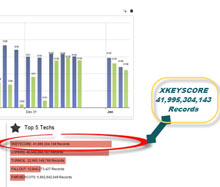
Legal v technical restrictions
While the Fisa Amendments Act of 2008 requires an individualized warrant for the targeting of US persons, NSA analysts are permitted to intercept the communications of such individuals without a warrant if they are in contact with one of the NSA's foreign targets.
The ACLU's deputy legal director, Jameel Jaffer, told the Guardian last month that national security officials expressly said that a primary purpose of the new law was to enable them to collect large amounts of Americans' communications without individualized warrants.
"The government doesn't need to 'target' Americans in order to collect huge volumes of their communications," said Jaffer. "The government inevitably sweeps up the communications of many Americans" when targeting foreign nationals for surveillance.
An example is provided by one XKeyscore document showing an NSAtarget in Tehran communicating with people in Frankfurt, Amsterdam and New York.
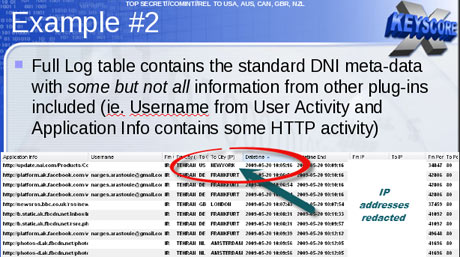
In recent years, the NSA has attempted to segregate exclusively domestic US communications in separate databases. But even NSA documents acknowledge that such efforts are imperfect, as even purely domestic communications can travel on foreign systems, and NSA tools are sometimes unable to identify the national origins of communications.
Moreover, all communications between Americans and someone on foreign soil are included in the same databases as foreign-to-foreign communications, making them readily searchable without warrants.
Some searches conducted by NSA analysts are periodically reviewed by their supervisors within the NSA. "It's very rare to be questioned on our searches," Snowden told the Guardian in June, "and even when we are, it's usually along the lines of: 'let's bulk up the justification'."
In a letter this week to senator Ron Wyden, director of national intelligence James Clapper acknowledged that NSA analysts have exceeded even legal limits as interpreted by the NSA in domestic surveillance.
Acknowledging what he called "a number of compliance problems", Clapper attributed them to "human error" or "highly sophisticated technology issues" rather than "bad faith".
However, Wyden said on the Senate floor on Tuesday: "These violations are more serious than those stated by the intelligence community, and are troubling."
In a statement to the Guardian, the NSA said: "NSA's activities are focused and specifically deployed against – and only against – legitimate foreign intelligence targets in response to requirements that our leaders need for information necessary to protect our nation and its interests.
"XKeyscore is used as a part of NSA's lawful foreign signals intelligence collection system.
"Allegations of widespread, unchecked analyst access to NSA collection data are simply not true. Access to XKeyscore, as well as all of NSA's analytic tools, is limited to only those personnel who require access for their assigned tasks … In addition, there are multiple technical, manual and supervisory checks and balances within the system to prevent deliberate misuse from occurring."

 WikiLeaks
WikiLeaks
No comments:
Post a Comment